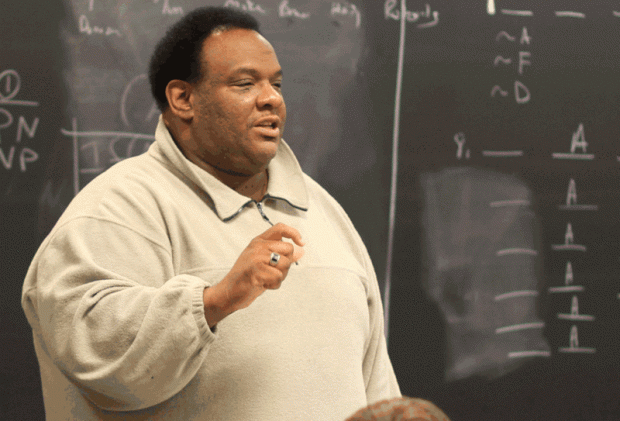
Julius Don Bailey in the classroom. (Photo Credit: Don Reed/The Chronicle)
In the United States, fat-shaming and fat-phobia are as American as apple pie. While the Black community is more likely to embrace obesity as curvy, that embrace often acts as a defense mechanism against mainstream and European standards of beauty—a standard which excludes anyone who isn’t White, thin and blonde, or some acceptable variation.
Yet even as we position full-figured as a body-type to be proud of, the weight loss market continues to be a multi-billion dollar industry.
Why?
Because as evolved and enlightened as we pretend to be, being overweight still carries a stigma in this country. Even though there are many reasons that one may be overweight, extra pounds are often viewed as lazy, undisciplined and unattractive with the magical power to make the largest person in the room the most invisible.
Even in the classroom.
Dr. Stacey Patton, Senior Enterprise Reporter at The Chronicle of Higher Education, delved into the world of overweight professors and examined the ways in which they are profiled and discriminated against because of their weight.
Read more from The Chronicle below:
Overweight professors across academe describe similar battles to achieve self-acceptance, full inclusion in academic life, and genuine respect from students and colleagues. Some struggle daily to navigate campus spaces that don’t comfortably accommodate their size. Some stand in front of classrooms and wonder whether their bodies influence how students perceive their minds. Some say they have trouble adhering to exercise plans or healthy eating habits because their jobs come with lots of research and little structure.
Yet larger professors often grapple with these concerns in isolation and silence. On a national level, discussions of obesity have become increasingly common—and, at times, increasingly contentious. But many fat professors, along with allies in the emerging field of fat studies, feel that colleges and universities have yet to hold productive conversations on the topic, especially when it comes to “fat shaming” and how size influences hiring, tenure, and promotion decisions.
“The situation for fat academics has worsened as our national discourse about obesity has ramped up,” says Christina Fisanick, an associate professor of English at California University of Pennsylvania.
Read more at The Chronicle.
Large Professor: How Being Overweight Affects Perceptions In The Classroom was originally published on newsone.com














